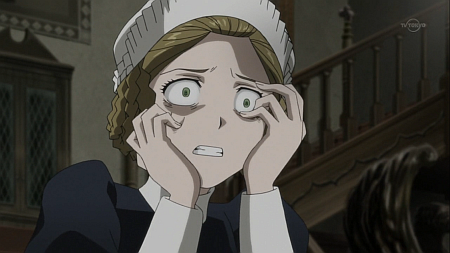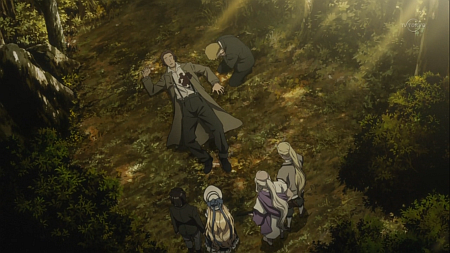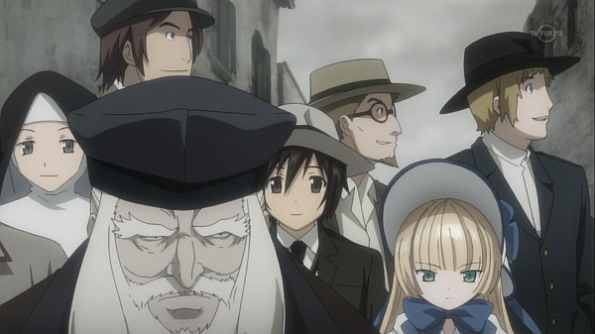Gosick Episode 7 – Journey to the Past
Last episode ended with Victorique, Kujou, Mildred (a woman dressed as a nun), and three other travelers entering the secluded and primitive village of the gray wolves, which appears to be a walled medieval town preserved from the passage of time by a policy of isolation. Before I go further, I’m going to need to talk a little bit about why Gosick messes up its depiction of medieval Europe as much as it does.
It’s easy to pick on Americans for not bothering to learn about foreign cultures, mainly because as a general rule we don’t. But occasionally it’s worth remembering that other cultures can be just as insular, and thus just as prone to get facts wrong. In Japanese media, this often happens in its depictions of Christianity, which is a tiny minority in Japan and viewed as something essentially foreign, but which often appears in anime series anyway. (Treating Catholic nuns as if they were the equivelent of Shinto shrine maidens is a particularly common error.)

The "nuns are mikos" trope is avoided here, only by making it clear that Mildred was only pretending to be a nun. At least, I hope that's what her wardrobe change is supposed to signify
Messing up how medieval Europe functioned, particularly with regard to religion, is also common, at least in any anime where medieval Europe winds up as the setting. Again, the tendency is to apply the template of Japanese village life, with its ancestor worship and particular style of festivals, and then just dress it in European dress with occasional nods toward monotheism. The otherwise excellent Spice and Wolf, set in a faux European setting, falls into this trap consistently.
The village of the gray wolves is just such a transplanted setting. As Victorique and the rest of the travelers arrive, the village is preparing for the summer festival to honor their ancestors, praying for a successful harvest in the fall. This involves lots of things completely incompatible with Catholicism or even Christianity, starting with how the cathedral in town has no priests and is where the village elder delivers prophecies after being possessed by the spirits of the town’s ancestors.

Once again, prophecy is depicted in a way to make it seem authentic. I suggest interested watchers take notes
Of course, this is a mystery series, and just by setting up the story in a non-existent country Gosick has shown its willingness to play fast and loose with the historical record. And the Japanese flavoring of the festival is important, because without the ritual burning, there wouldn’t be a creative way for one of the visitors to die.
The three men who have come with Kujou and Victorique generally act like obnoxious tourists, insulting the townsfolk and making a ruckus. The most jerkish of them, Alan, somehow finds himself unconscious and dressed up as a monster on top of one of the carts that is set on fire as part of the ritual, and is burnt to death. The village elder excuses it as a drunken prank gone horribly wrong, but given he “accidentally” mistakes another of the guests for a wolf and kills him with a shotgun, his opinion is a bit suspect.

I don't know if there are official rules for visiting insular communities and getting out alive, but if there are, high on the list should be "don't interfere with local religious rituals"
Alongside those murders is the 20 year old murder Victorique came to investigate, the one blamed on her mother. Despite being a very cold case, there are still some niggling doubts on the issue, namely how the tiny Cordelia could have driven in the knife into her victim’s upper back. But the locked room aspect of the case seemingly makes her the only possible culprit.
Victorique apparently solves the case by the end of the episode, even though she doesn’t reveal her findings to Kujo and isn’t certain how to prove her case. This is actually a nice acknowledgment that Victorique’s method of crime solving isn’t inescapable logic so much as wild leaps supported by some mysterious inner wisdom. While it’s convincing to her, it doesn’t seem like much more than speculation to others absent some hard proof she can uncover once she knows her culprit.

Victorique is aided by the ramblings of the maid Harminia, who was a child at the time the murder took place and has serious psychological scarring because of it. There's rarely a moment where she doesn't seem a little unhinged
Just as if not more interesting is the mystery of what happened a decade ago, when a visitor named Brian Roscoe came to the town and paid for it to get electricity and at least one telephone. Around the same time, someone cleared out what remained of Cordelia’s belongings, and the show makes clear this is clearly not a coincidence.
What Roscoe’s motives are, or how he is connected to Cordelia, aren’t questions this episode is interested in addressing while it has two separate murder plots to address. But the hints of a deeper mystery are always welcome, particularly in a show which tends to resolve its official mysteries of the week (or two) in such a brusque fashion. If this is more hinting of the metaplot, I’d like for the solution to be delayed just a little longer.

Kujou does his best to stand guard as Victorique takes a bath, but there's no one to protect him from her bad singing
Kujou and Victorique’s relationship continues to evolve, with Kujou not just viewing himself as Victorique’s self appointed protector, but as a friend, or even something more. When given a chance to hear a prophecy about the future, his only questions concern Victorique. I’d have liked for there to have been a slightly better lead-up to his growing romantic feelings, but given the rarity of romance shows these days that aren’t also harems, I’ll give it a pass here. I just wish this episode gave the same intentionality their relationship that we saw last time.
Gosick will likely resolve at least one of the mysteries next time, although I’ve already given my opinion that it shouldn’t resolve all of them. I would like it, however, if the show spent less time world-building and more time character-building. Watching the show creatively botch medieval European life can be amusing, but at the moment I’d prefer the show give more time to what the audience really cares about. And whatever that may be, it isn’t a fictional village.

At least, Gosick should resolve a few of its mysteries soon. The show is running out of unsympathetic minor characters to kill
You can watch the episode here.
-
June 25, 2011 at 8:57 pmGosick Episode 22 – Repeating Past Misakes « antiotaku
-
September 25, 2011 at 8:53 amAnime Review: Gosick Episode 7 | This Euphoria!
